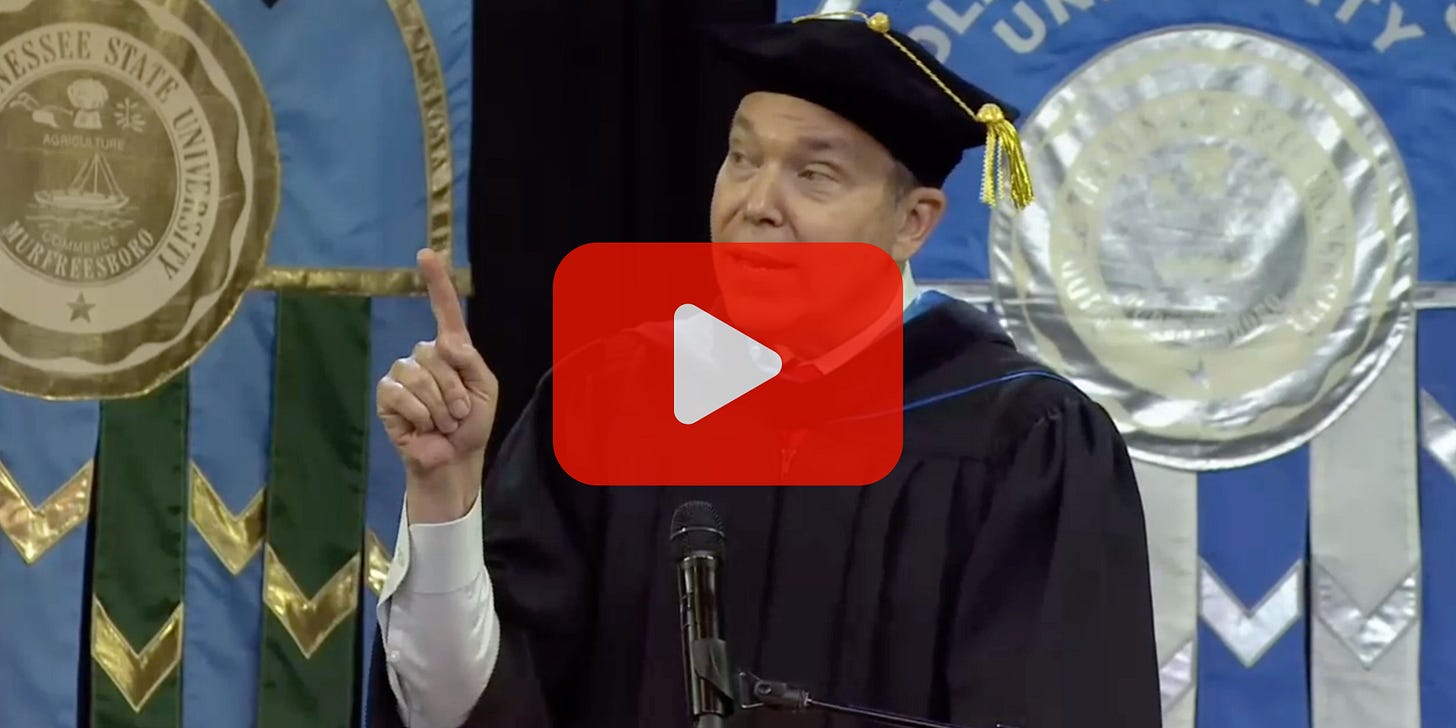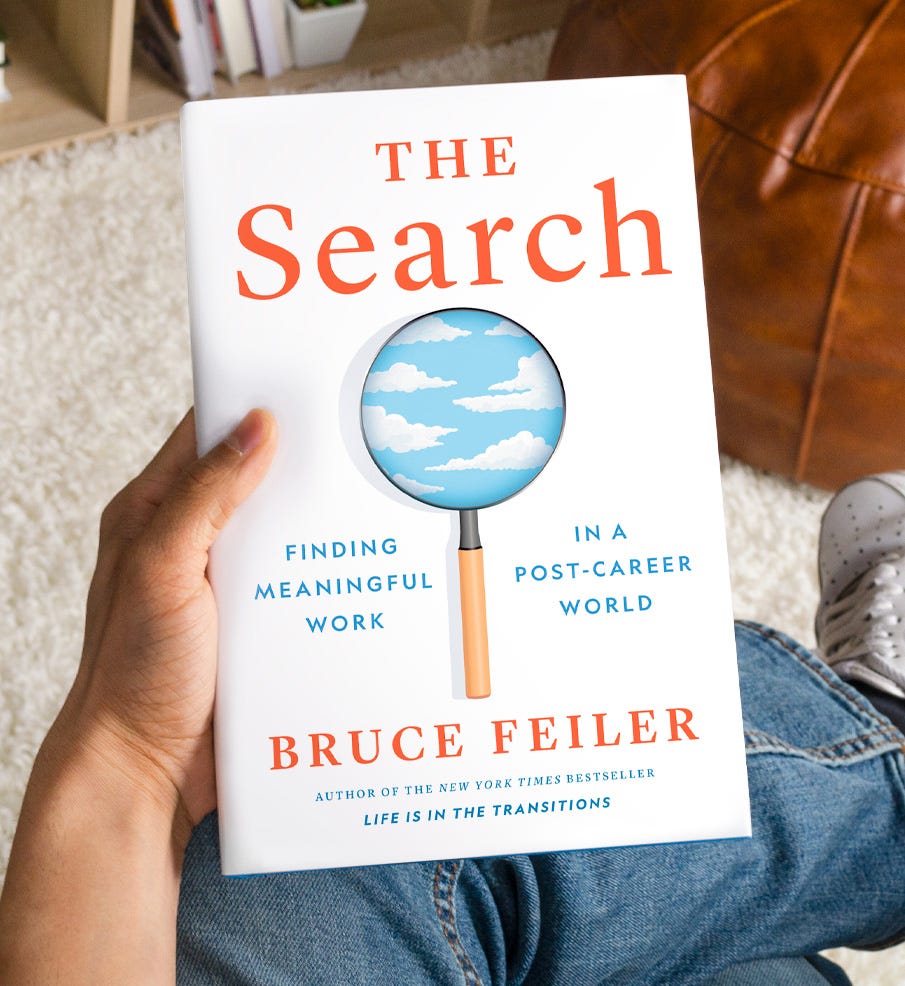Go Forth: 3 Pieces of Advice for College Students
Highlights from My Convocation Address: Disagree with Your Friends, Change Your Mind, Write Your Story
For millions of families around the world, back to school is a time of enormous transition. For those just starting college, the transition is particularly momentous, as students and parents alike are separating from one another, shedding lifelong habits, and experimenting with new ones.
Last week I experienced this transition from both ends. On Monday, my wife, Linda, and I dropped our identical twin daughters off at college [see photo below]. Four days later, I was invited to give the Convocation Address at Middle Tennessee State University outside Nashville, where all 3200 incoming members of the first-year class were assigned to read my book, Life Is in the Transitions.
You can watch my address in the video above; below is a transcript of my remarks. So grateful to have had this unique convergence. I hope you enjoy.
___
Let’s imagine it to be a day not unlike today. The setting was a crossroads—not unlike the one where we gather right now. Perhaps there was a covering—not unlike the one above us.
Like today, some dignitaries from the community had come out for the occasion. Family members had gathered from far and wide.
But in the center of it all were the travelers. Those preparing for the journey of a lifetime. Those on the brink of the greatest life transition they had ever experienced.
And while this day occurred 4,000 years ago, we actually have an account—passed down through the generations, from oral history to scroll.
That account appears in the Book of Genesis, Chapter 11: a traveler gathers on the brink of change, bids goodbye to his family, and heads out on a journey so unfamiliar he doesn’t even know where he’s going.
That traveler is Abraham. And his journey from his homeland in Mesopotamia to what we now call the Promised Land is one of the most important journeys of all time.
But he is not alone in that journey. In story after story throughout history, we have a traveler, who says goodbye to the world they know and heads into a world they don’t know.
Abraham. Moses. Jesus. Muhammad. Buddha.
And not just religious figures: Oedipus. Hercules. Jason. Odysseus.
And not just men: Atalanta. Eurydice. Jasmine. The Little Mermaid.
And not just the past: Two of the greatest heroes of our time walk away from worlds they know and venture into worlds they don’t know. I’m speaking, of course, of Oppenheimer and Barbie.
The greatest stories ever told are of people who go on a journey not unlike the journey on which all of you are about to embark.
But before I remind you of the advice that Abraham and those other travelers receive—and share some advice of my own—I want to begin with another part of that story from the Book of Genesis, one that’s often overlooked.
It’s the family that Abraham leaves behind. Just days ago, my wife, Linda, and I dropped our identical twin daughters off at college. So, I’d like to begin by speaking to my fellow parents, especially those, like me, who are becoming empty nesters.
Parenting is unlike any other endeavor: Our children come into our lives entirely dependent on us. But our job is to put ourselves out of business—to help our children become entirely independent from us. Sure, it’s never entirely, we know. They will always be our children.
But I’m here to tell you: You’ve done your job. And what’s more: There is blessing in your tears. There is purpose in saying goodbye. There is wisdom in the empty nest.
Researchers at the University of Montana have found that even birds struggle with the empty nest. If the birds leave too early, they suffer; if the birds leave too late, they suffer. But when the birds find the right time to leave the nest, their survival rates soar.
Now is the right time.
And now to my message to the travelers.
The good news for me: I don’t have to go far looking for the best advice I can give you. You can find similar words in the very next chapter of Genesis, when an unknown voice, the voice of the divine, says, in Hebrew, Lech lecha; in English, “Go forth.”
And that’s what I’m here to say to you:
Go forth, go far, go away, come back, go again, go by yourself, go with a friend, go with a sibling, go with a lover, come, go, never stop, be engaged in the questions of your day, be a part of a brand new world, go forth with what you have learned from us, come back and teach us something new, go, go never stop, jump, fly, walk, run, snowboard, skateboard, raft, row, go out, go out and embrace the world, come back, come back and build a new home, but whatever you do, just go, now, while you are young and free and full of hope: in a word, travel.
Travel. It seems like such a simple thing. But is it?
The second edition of the Random House Unabridged Dictionary that sits by my desk defines travel as “to go from one place to another.”
To “go from here to there.” To “be transmitted.”
To travel, in other words, is to change, to adapt, to grow.
To travel is to transition.
In a world where we value “waving the flag,” “repping the team,” “demonizing the other,” traveling is a forgotten art.
In that spirit of travel, in honor of Abraham and Ulysses and Jason and Jasmine, in tribute to the transition you’re about to begin, that I’d like to offer you three pieces of advice for the journey ahead.
#1: Disagree with Your Friends
There was a story in the news this week about a man and a woman who went on a first date. After drinks, the man took out his credit card and paid. A few days later, he messaged his date and asked to see her again. When she politely declined, he asked her to do something that for most of the old fogeys like me in this room, would have been unthinkable: He asked her to Venmo him payment for her drinks.
Now as unimaginable as that story is, it’s the next part that I want you to remember: Her reason for not going out with him again—she didn’t like his political views.
Now speaking as a father, I hope that each one of you finds loving, romantic partners, with whom you agree on everything—politics, religion, the ripeness of bananas you want in your future home. But when it comes to friendships, suitemates, classmates, I feel the opposite: I pray that you find friends with whom you disagree.
We live today in a country where people reside in zip codes and belong to organizations only with people with whom they agree; we consume news sources and follow social media designed to reinforce our preexisting opinions; we are polarized because we are choosing to be polarized. Because it’s easier. Because it’s more comfortable.
The next four years may be the last best shot you have to learn how to live alongside people with whom you disagree, to learn how to listen to them, to learn to love them.
Speaking for all us fogeys: Please show us how it’s done. Please save our country. Please go out of your way to have friends with whom you disagree—and talk openly and respectfully about those disagreements.
#2: Change Your Mind
That leads to lesson #2: Change your mind.
In my book I talk about how life transitions involve three phases. The first is what we are doing today: Accepting that you’re in a deep moment of instability and transformation, then marking that occasion with ritual and ceremony.
The second phase is what you are entering now: the messy middle. And the messy middle involves two essential skills: shedding certain habits you’ve become accustomed to, then creating new habits.
But as hard as changing habits is, changing your mind is even harder.
Researchers have shown that our brains are faster at processing opinions we agree with and extremely efficient at rejecting evidence that’s incompatible with our beliefs.
I beseech you to practice the art of changing your mind, a skill that will only become more critical as we confront a series of new global threats that demand fresh ideas—from AI, to pandemics, to a warming planet.
Go to the ballet. Visit an organic farm. Attend a meeting of the Queer-Straight Alliance. Celebrate a Ramadan break fast. Expose yourself to things that you’re unfamiliar with.
Open your mind. Then change your mind.
“Progress is impossible without change,” George Bernard Shaw said. “And those who cannot change their minds cannot change anything.”
#3: Write Your Own Story
The final part of a life transition may be the most important, and it, too, begins today: It’s writing a new chapter in your life story.
A life transition, at its heart, is an autobiographical occasion, a moment when we are called on to rethink and revise the story we tell ourselves about who we are. That story includes small details—Do I like to stay up later or get up early? Am I a carnivore or a vegan?
But there are big questions, too: Do I believe in truth? Do I believe in forgiveness? What brings me happiness? What brings me meaning?
And as you rewrite that story, I encourage you to not be bound by the past. ‘What’s past is prologue,” Shakespeare wrote in The Tempest. And while that’s true, the prologue need not dictate the plot.
You can alter the plot of your life story whenever you want, if for no other reason that you want to. Don’t miss the chance.
In Genesis 12, after God calls Abraham to ‘go forth,’ he makes him a promise.
I will make of you a great nation,
And I will bless you;
I will bless those who bless you
And curse him who curses you;
And all the families of the earth
Will bless themselves through you.
And while I don’t have the authority or the ability to make that promise to you. I can assure you that each of you has the ability to make it for yourself.
You can make yourself a blessing to this world.
You can choose to bless us with your gifts.
You can make your contributions to our planet, as God later says, as numerous as the stars.
And I end today with a message that is so personal to me that it’s the same message I gave my own daughters when I hugged them goodbye, with tears in my eyes, just days ago:
Don’t wait for it to come to you. Go out and get it.
This was your dream to be here today. Now go forth and make that dream come true.
Takes trip. Take chances. Take off.
Congratulations and happy travels.
☀
Thank you for reading The Nonlinear Life. This is a reader supported newsletter. You can help by ordering a copy my new book. Click on the photo below to learn more.
Meanwhile, please help us grow the community by subscribing, sharing, and commenting below. If you'd like to do a storytelling project with a loved one similar to the one I did with my father, click here to learn more.
You might enjoy reading these posts:
Help! I’m in a Life Transition
My 15th Cancerversary: Reflections on Being a Survivor
Or, you can contact me directly.









Congratulations on getting the college to make Transitions required reading. While I thought it was extremely important, I'm further along with many more life quakes than a college student. Looking back through all of my professional transitions, I would strongly recommend The Search as a standard college textbook. Non of my college professors said diddly squat about everything in The Search, which is everything after graduation and the next 50 or so years.
I'm going to discuss your convocation address and book (glad you borrowed your title from my favorite philosopher, Wm James!) in my Intro to Philosophy classes at MTSU. Thanks for coming!